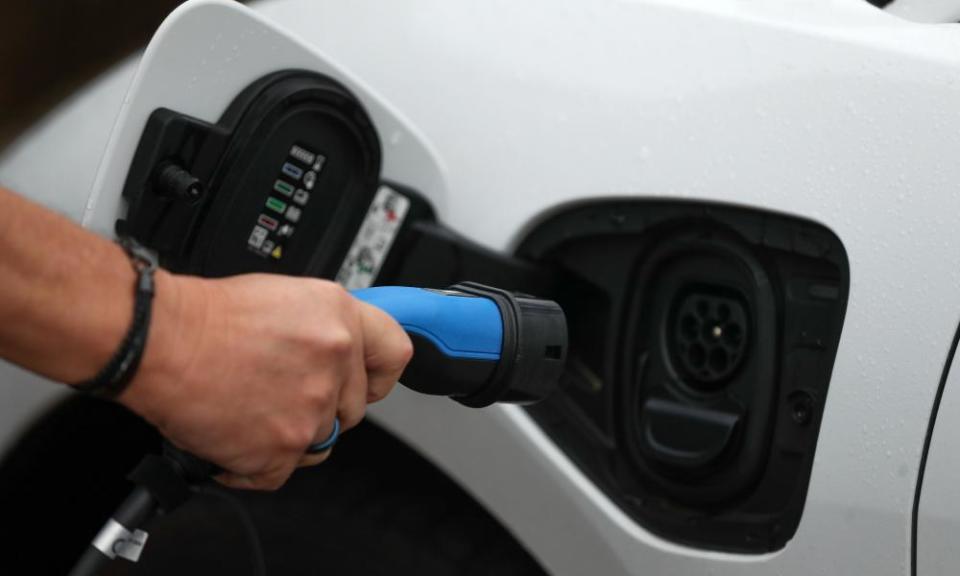Victoria's electric vehicle tax could reduce clean car use by 25%, researcher says

Victoria’s planned road user tax for electric vehicles will significantly hold back clean car use, according to research that found it could lead to a 25% lower share of sales in 2050 than otherwise expected.
The Andrews government plans to impose a 2.5c a kilometre charge on electric vehicles (EVs) and a 2c/km charge on plug-in hybrid cars from July. South Australia is also planning an EV road user charge, but is yet to announce the rate.
An analysis by Dr Jake Whitehead, from the University of Queensland’s Dow Centre for Sustainable Engineering Innovation, said federal government modelling had suggested EVs would be about 65% of new car sales by 2050, based on existing policies.
Related: 'We'll be left behind': Australia's electric car inertia is getting it nowhere
Modelling of the 2.5c tax rate – undertaken before Victoria made its announcement – found this would be expected to fall to 40% if the additional cost was imposed without being accompanied by new incentives.
Applied nationally, this would equate to at least 4.9m fewer EV sales. Whitehead said it would likely lead to greenhouse gas emissions from transport continuing to increase given the overall number of cars on the road were forecast to rise significantly and a greater proportion would run on fossil fuels.
He said the EV per kilometre charge policy was “completely incongruent” with the states’ targets of reaching net zero emissions by 2050.
A road user tax could make sense, he said, but should be accompanied by other measures that made buying clean cars more attractive, such as removing or reducing registration costs, stamp duty, GST and road tolls.
“It is very easy to claim net zero targets, but there needs to be commitments to back it up and this is running in the wrong direction,” Whitehead said.
Only about 0.6% of new cars sold in Australia are electric, a lower share than virtually all other OECD countries. National transport emissions have increased by 17% since 2005.
The federal government promised a national EV strategy last year, but Scott Morrison attacked a Labor policy to promote the technology during the subsequent election campaign as a plan to “end the weekend” and the Coalition policy was later delayed. It has now been rolled into a “future fuels” policy, covering EVs, hydrogen and biofuels, with a consultation paper promised before the end of the year.
Related: 'Disastrous' or a smart move? How Victoria's case for an electric car usage tax stacks up
The push to introduce road user charges for clean cars is based on the argument drivers pay for roads through a national excise on fuel, and EV drivers do not pay this charge.
Critics of the plan point out fuel excise goes into general budget revenue and is not specifically dedicated to road funding, and that EV use needs to expand rapidly to cut emissions given the urgency of the climate crisis.
The states believe introducing a road user charge will be easier now, when there is a small EV market and many owners are comparatively wealthy, and would be more politically challenging if left until the technology makes up a significant share of the new car market.
The Victorian government did not respond to questions from Guardian Australia before publication. The treasurer, Tim Pallas, has said he hoped the tax would create a “fairer system” for taxing road users.
An EV road user charge has also been considered by the New South Wales government and is supported by Infrastructure Partnerships Australia, an industry organisation, but is opposed by some politicians, including the NSW-based federal Liberal MP Trent Zimmerman.
Whitehead said other countries had set clear targets to move to cleaner vehicles and backed it with incentives to encourage EV uptake. Britain last week announced a ban on new petrol and diesel cars from 2030, Norway plans to phase out new fossil fuel cars by 2025 and the US offers a national US$7,500 tax rebate on EV purchases.
He said claims by government representatives that higher taxes would not affect sales did not stand up. “I don’t know what school of economics they attended, but every economist will tell you if you increase costs then sales will decrease,” he said. “If these states want to get to net zero they’ve got to get real about this and stop trying to sell a furphy.”
Whitehead’s study, which has not yet been peer-reviewed and has been released earlier than planned in the wake of the state government announcements, included a survey of 500 Queensland households on their preferences on road pricing.
They found a 2.5c/km tax was seen as being equivalent to a $4,500 increase in a vehicle’s purchase price. By comparison, a $5 congestion tax charged on driving in inner-city areas, capped at $15 a day, was seen as equivalent to adding $2,800.
A proposal to give a $1,000 credit on electricity bills to people who buy an EV was found to effectively reduce the cost of a new EV by $6,000. Removing existing road taxes – registration costs, stamp duty, GST and road tolls – would cut it by more than $11,000.

 Yahoo Finance
Yahoo Finance 